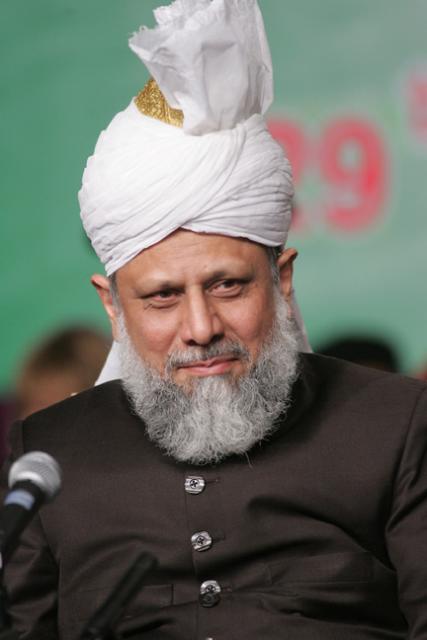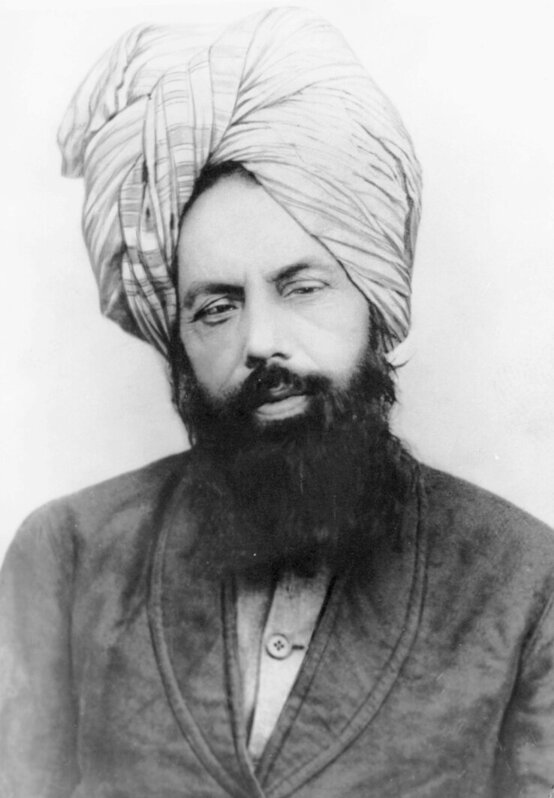Islam Ahmadiyya is not a Cult, but anti-Ahmadi Islam in Danger of Becoming One.

by Tahir Nasser
Is the Ahmadiyya Muslim Jama’ah a cult? Such is the allegation made by many of its detractors. In a latest endeavour to attack the community and its beliefs, some prominent anti-Ahmadi individuals have resurrected such claims. Such detractors typically do not define what a cult is, and so neither were able to prove its definition in application to the Ahmadiyya Muslim Jama’ah. This is not surprising, since people who make such allegations typically aren’t in the habit of reading books, as evidenced by their refusal to read a single book of the Ahmadiyya Muslim Community.
So let’s take a look at what the definition of a “cult” is, how Islam was defined as a religion and not as a cult, and which camp Ahmadiyya Islam falls into.
What is a Cult?
The International Cultic Studies Association (ICSA) defines a cult as “an ideological organization held together by charismatic relations and demanding total commitment”—a definition that underscores the high-demand and high-control nature of cults. Additionally, sociological perspectives highlight that cults often have leaders who exercise authoritarian control, discourage independent thinking, and isolate members from external influences. A cult is often characterised by its intense devotion to a charismatic leader or an exclusive ideology, diverging significantly from mainstream societal norms. Such groups are typically led by a self-appointed figure who demands unwavering loyalty and exercises stringent control over members. This leader may claim access to unique or esoteric truths and often employs manipulative tactics to maintain influence.
There is no doubt that there is a significant overlap in certain aspects of what a devoted follower may call a religion, and a recalcitrant opponent may call a cult. There is however, a key objective difference between the two: cults frequently struggle to endure beyond the death of their leader, as they rely heavily on the leader’s persona for unity and direction. The focal point of the community of followers is not on a set of religious or ideological beliefs. Rather, it is centred upon the founding person of the cult, and with his or her death, the movement itself fades away.
Definition of Hazrat Abu Bakr رضي الله عنه
This definition was beautifully encapsulated by the first successor (Caliph) of Islam: Hazrat Abu Bakr رضي الله عنه. On the death of the Prophet Muhammad ﷺ while the Muslims were deeply affected and could not believe that their beloved Messenger had died, Abu Bakr رضي الله عنه stood at the pulpit and declared:
فَمَنْ كَانَ مِنْكُمْ يَعْبُدُ مُحَمَّدًا صلى الله عليه وسلم فَإِنَّ مُحَمَّدًا صلى الله عليه وسلم قَدْ مَاتَ، وَمَنْ كَانَ يَعْبُدُ اللَّهَ فَإِنَّ اللَّهَ حَىٌّ لاَ يَمُوتُ
Whoever amongst you worshipped Muhammad, then (know) that Muhammad is dead, but whoever worshipped Allah, (know that) Allah is alive and will never die
Sahih al-Bukhari 1241, 1242
In these short words, he demonstrated the difference between a cult and a religion. A cult is centred around a single, human individual, while a religion is focussed upon a set of beliefs and principles, which live on past the individual through whom they were conveyed (the prophet). This organisation around shared beliefs in a higher power or divine principles rather than the personality of a single leader are characterised by leadership succession that enable them to thrive even after the demise of their founding figure.
Is Ahmadiyya Islam a Cult?
The Ahmadiyya Muslim Jama’at exemplifies the hallmarks of a religious community rather than a cult, as defined by Hazrat Abu Bakr رضي الله عنه. Islam Ahmadiyya claims to be the prophesied revival of Islam by the Imam Mahdi and Masih (Messiah), Hazrat Mirza Ghulam Ahmad عليه السلام who founded the community in 1889. Since then, the community has continued to grow and prosper under successive leaders known as Caliphs, in exactly the same way that the caliphate thrived after the Prophet Muhammad ﷺ. The current head, Hazrat Mirza Masroor Ahmad, serves as both the spiritual and administrative leader, guiding the community’s global endeavours. This structured leadership ensures continuity and stability beyond any single individual’s lifetime.

Deeply rooted in Islamic teachings, the Ahmadiyya community adheres to the Five Pillars of Islam and the Six Articles of Faith. It emphasises devotion to God and upholds the unity of God as central to its beliefs.
In conclusion, based on academic definitions and historical precedents, it is clear that the Ahmadiyya Muslim Jama’ah is not a cult. Its continuity through successive leadership, and foundational focus on Islamic teachings distinguish it as a religious community dedicated to spiritual growth and service to humanity.
Are Anti-Ahmadi Muslims Following a Cult?
While Ahmadiyya Islam is not a cult, it would appear that individuals who make such accusations are rapidly reducing the religion they inherited, into a cult. What do I mean?
Well, if a religion is defined by its adoption and focus on religious teachings, and a cult is defined by its focus upon an individual, then by all accounts, many (not all) sunni Muslims, especially of a Pakistani heritage, appear to have joined an anti-Ahmadi cult.
Really? What’s the proof!
The best proof can be seen how many (not all) Sunni Muslims appear to have twisted the credo (Kalima) of Islam that has been established since its inception, in preference for a distorted translation that has no bearing to the Arabic.
You see, the fundamental credo of Islam is as follows:
لا إله إلا الله محمد رسول الله
There is no god but Allah; Muhammad is the messenger of Allah
This is the statement that people for 1300+ years have been saying to enter into the body of Islam as Muslims. And yet – yet – this has all changed with Ahmadiyya Islam. In example after example, we see cases time and again, of new Muslims being inducted into Islam in a Sunni Masjid (mosque), reciting these words after a Sunni preacher, and being taught a totally false translation of: There is no deity but God; Muhammad is the final Messenger of God. Here is a thread of documented examples:





There are quite literally hundreds and even thousands of examples that can be given. Why is this happening? Why are Sunni Muslims literally adding words into the basic and most fundamental credo of Islam?
Simply put, it is because slowly, slowly, their Islam is becoming more defined not by its tenets, beliefs and practises, but rather, by its unhealthy obsession with a particular individual: Hazrat Mirza Ghulam Ahmad عليه السلام. They have thus changed the fundamental credo of Islam because of their hatred for him and as a result of defining themselves increasingly by their rejection of him, rather than by their acceptance and following of particular religious tenets.
In this manner, they have begun the slow and gradual decline from religious community into a cult. This is extremely sad to see and it is not something which we in the Ahmadiyya Muslim Jama’ah in any way are pleased with. It pains us immensely to see the beautiful credo of Islam added to by those who claim to be its defenders. We wish and pray that the Muslims who reject Hazrat Mirza Ghulam Ahmad عليه السلام will return to the credo or kalima of Islam and desist from adding their own words to the words of God.
Words of Advice for Muslims
When we consider that some anti-Ahmadis have been obsessively attacking the person and character of the founder of the Ahmadiyya Jama’ah in Islam, Hazrat Mirza Ghulam Ahmad عليه السلام, while admitting that they have never and will never read any of his literature to ascertain his truth or not, we are drawn to the inexorable conclusion that such individuals are themselves following a cult – the cult of anti-Ahmadi hatred. Such individuals have become poisoned to such an extent that they will not even consider the arguments advanced by Hazrat Ahmad عليه السلام. This is known as nothing other than prejudice and bigotry, and is the hallmark of a cult-follower.

As Ahmadi Muslims however, we not only read, but also ponder upon the arguments made by both Sunni or Shi’a Muslims, and arguments advanced by Hazrat Mirza Ghulam Ahmad عليه السلام. The simple proof of this is the fact that Ahmadiyya Islam is only just over a century old. The majority of our community members were once Sunni or Shi’a Muslims, or the children of those who were born into these communities. It was they, against immense social and familial pressure, who felt compelled by the spiritual and intellectual power of arguments advanced by Hazrat Mirza Ghulam Ahmad عليه السلام, as well as the shining spiritual signs of his truth, to accept him. This is precisely the opposite behaviour of those indoctrinated into cults; their beliefs are characterised by persistence in the face of logic, not persuasion by virtue of it.
Anti-Ahmadis! We call you to return to Islam! Leave off your bigotry and prejudicial attitude. Return to sanity. We do not call upon you to accept Ahmadiyya Islam. We only ask that you read the literature of its founder with an open heart. That will be sufficient to rid yourself of this unholy stain of prejudice and bigotry.
More articles
Contact
National Outreach Department:181 London Rd, Morden SM4 5PT, U.K.
Email: [email protected]Phone: 0208 6877804
@ 2025 Ahmadiyya Muslim Community, All Rights Reserved.